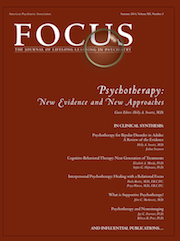Psychotherapy for Bipolar Disorder in Adults: A Review of the Evidence
Abstract
Although pharmacotherapy is the mainstay of treatment for bipolar disorder, medication offers only partial relief for patients. Treatment with pharmacologic interventions alone is associated with disappointingly low rates of remission, high rates of recurrence, residual symptoms, and psychosocial impairment. Bipolar-specific therapy is increasingly recommended as an essential component of illness management. This review summarizes the available data on psychotherapy for adults with bipolar disorder. We conducted a search of the literature for outcome studies published between 1995 and 2013 and identified 35 reports of 28 randomized controlled trials testing individual or group psychosocial interventions for adults with bipolar disorder. These reports include systematic trials investigating the efficacy and effectiveness of individual psychoeducation, group psychoeducation, individual cognitive-behavioral therapy, group cognitive-behavioral therapy, family therapy, interpersonal and social rhythm therapy, and integrated care management. The evidence demonstrates that bipolar disorder-specific psychotherapies, when added to medication for the treatment of bipolar disorder, consistently show advantages over medication alone on measures of symptom burden and risk of relapse. Whether delivered in a group or individual format, those who receive bipolar disorder-specific psychotherapy fare better than those who do not. Psychotherapeutic strategies common to most bipolar disorder-specific interventions are identified.



